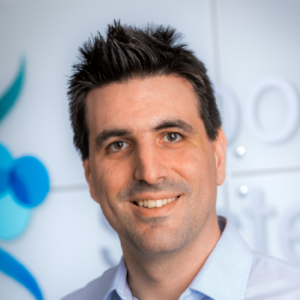Ben Gyori Awarded a DARPA Director’s Fellowship
By Juliann Tefft | July 8, 2022

Benjamin M. Gyori, Ph.D., Director of the Machine Assisted Modeling & Analysis Platform at the Lab of Systems Pharmacology at Harvard Medical School, received the Director’s Fellowship Award from the Defense Advanced Research Projects Agency (DARPA). This prestigious award extends Gyori’s 2020 DARPA Young Faculty Award (YFA) for an additional year and further recognizes Gyori’s impressive accomplishments as an early career principal investigator.
Gyori’s work focuses on how artificial intelligence can help humans interact with biological knowledge. A massive problem in biomedicine is that the rate of publications outpaces what human scientists can manage to read, which generates an intractable amount of new data and knowledge each year. To help, we need new and better ways to monitor new knowledge as it appears and integrate these discoveries with prior knowledge in an actionable form. That’s where Gyori and the INDRA team come in.
Our project is a step towards solving this problem. Our work can be applied to many other domains as well – we aim to help any field where information around a complex, interconnected system is rapidly evolving, and people need to make informed decisions in the face of evolving information. – Ben Gyori
Information overload has been particularly acute during the COVID-19 pandemic. Three hundred new COVID-19-related papers are published each day – as of July 2022, there are more than 250,000 papers about COVID on PubMed. In theory, each paper contains data that can inform important public health and therapeutic decisions, but filtering through the information is a considerable challenge in the face of such a large body of work.
With the DARPA Young Faculty Award, Gyori and his team members Charles Hoyt and Klas Karis used machine-reading and scalable knowledge assembly algorithms to create a knowledge graph database from the biomedical literature and other structured data sources. The graph database contains over 300 million relationships, which represent various biological information – like causal mechanisms, experimental findings, and properties of proteins, small molecules, diseases, and clinical trials – all linked to primary evidence in the literature. Their graph database supports both machine-assisted analysis of experimental data and human-machine dialogue (i.e., interaction through the English language), to allow researchers to make discoveries using this knowledge.
With the additional Director’s Fellowship Award funding, Gyori and his team will develop a public web portal that will allow users to analyze and explore the data within the automatically assembled knowledge graphs. They also plan to pursue several projects to apply these rich biomedical datasets, such as to infer drug mechanisms of action and explain unexpected drug side effects.
This award is a huge honor that recognizes the important work we’ve been doing over these past few years. It shows that our technology has the potential for many exciting applications – within biomedicine and beyond. I’m thrilled to continue expanding on our research to understand and manage more complex systems. – Ben Gyori
To find out more, visit INDRA labs or follow us on Twitter at IndraSysBio.

